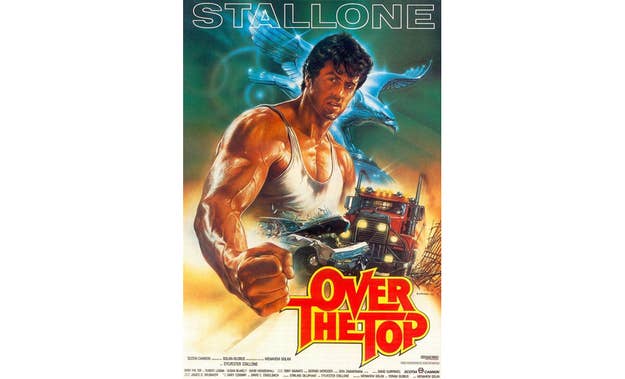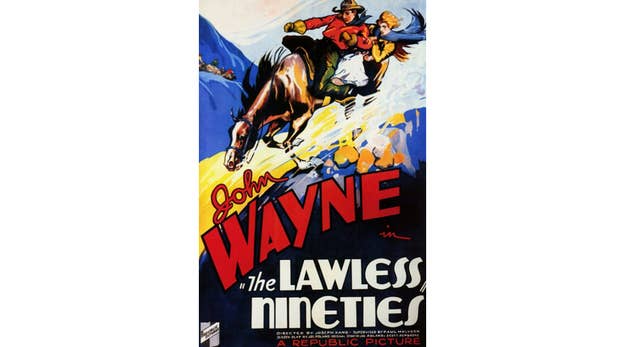
If you're in the mood for a chunk of awesome from the rah-rah Reagan years: Over the Top (1986, Menahem Golan)
There’s something to be said for playing it straight. Menahem Golan’s Over the Top is ludicrous on its face – an underdog movie about arm wrestling, festooned with a dozen father/son melodrama clichés. As the film marks the travels of the wonderfully-named truck driver Lincoln Hawk (Sylvester Stallone) and his attempts to win the love of his estranged son by winning an arm-wrestling tournament, it leaves no expected emotional beat untouched; it’s essentially a Wallace Beery movie dragged into the Reagan ‘80s, and it’s as shameless as it sounds. Sick mom, evil grandfather (Robert Loggia!), no money, jail time… this is a cute puppy away from exploding into a splattery paste of saccharine. But can you slag manipulative material if the manipulation works? Because Over the Top, as obvious and manipulative as it is, works like gangbusters, mainly because it believes wholeheartedly in its silly schematic squareness.
It helps that Stallone is tapping into a side of his persona not much seen after his ascent to superstardom. Between the Rocky and Rambo sequels and his reinvention as the stone-faced muscular all-American ubermensch, it’s easy to forget that he started from nothing. Before he was a god, he was a likeable schmuck, and he digs back deep into that hazy past to portray the itinerant Lincoln Hawk. Quiet, confident without being showy, downtrodden without being morose, Stallone radiates the kind of square-jawed dignity needed to sell this hoary corn, and he has a good rapport with David Mendenhall, who plays the young kid forced to bond with a dad he never knew. He’s back in Balboa-type palookaville, a blue-collar loser who nevertheless has freakishly huge arms and is going to use them to bring himself a little deserved glory – a big beefy symbol of the American Dream. Over the Top may not be as blatant in its flag-waving as Rocky IV, but its patriotism is difficult to miss. It aligns itself with the salt-of-the-earth Hawk, the kind of hard-working people who “make this country great,” against the heartless moneyed ways of antagonist Loggia – the real America, the one that keeps this country going, is a sea of trucker hats and steak and sweaty guys trying their best to heave their way to triumph.

If you're in the mood for one of America's finest stars in his youth: The Lawless Nineties (1936, Joseph Kane)
Before he was the most American of American stars, John Wayne was just another young actor in the ‘30s knocking out low-budget Westerns. He had to work for and grow into his iconic status just like the nation and the cinematic genre he represents. The Lawless Nineties, a fast-moving Republic B-oater, finds all three of these elements in the process of building their mythologies. The film centers around Wayne, a government enforcer, and his efforts to take down a gang of bandits intent on sabotaging the impending Wyoming vote for statehood, with the help of a local sheriff, a firebrand newspaper man and his strong-willed daughter. (There’s also an underdeveloped side plot involving two black characters and their day-to-day life, which provides lots of space for off-putting racial caricatures — an unfortunate signifier of the times.)
The daughter, played by Ann Rutherford, is told late in the film that her paper will not be allowed to publish on the day of the vote, to which she cries, “Haven’t you any patriotism?” At a trim 55 minutes, The Lawless Nineties has no time to be anything other than that blunt — it’s pro-America, pro-democracy and pro-free press. It supports the little guy and the common man against the forces of lawless frontier tyranny, with Wayne as the benevolent government representative who exists to fight the good fight (against voter fraud, no less) so all may live in prosperity. Even at this early stage in his career, Wayne is standing in for Uncle Sam, and his easy smile, undeniable charisma and flinty toughness make you think this guy must be right about the country and everything is just going to work out fine. That’s a lot to hang on unpretentious matinee fodder, but oftentimes genre entertainments, which are allowed to say things more directly, can say more about the predominant culture than the big prestige projects. During the big battle at the film’s climax, a character cries, “It’s the end of the world!” “No, it’s the beginning of Wyoming!” comes the response. It’s a violent birth but a necessary one – another step towards the icons we know today.

If you're in the mood for a war movie from an earlier wartime era, with all that entails: Gung Ho! (1943, Ray Enright)
Strange, the things that can get made when it comes time to rally ‘round the flag. The Randolph Scott-starring war movie/WWII propaganda vehicle Gung Ho! comes complete with a wordy subtitle that neatly sums up the plot: The Story of Carlson’s Makin Island Raiders. A title card then informs us that what we’re about to see is ostensibly a true account of the Second Marine Raider Battalion from their formation through their first major victory. If so, reality looks an awful lot like the movies. Part quasi-documentary (complete with filmstrip-ready narration) and part standard-issue army-set action/drama, Gung Ho! is solid yet undistinguished, a film with little ambition beyond compelling those in the audience to buy war bonds – Scott even gets to do that thing at the end where he turns and delivers a rousing speech straight into the camera, as though to break the fourth wall and give these words directly to the audience. Its interest today is mainly historical, and I don’t mean the early role for a young Robert Mitchum.
When I call this propaganda, I mean that not as pejorative but descriptive – director Ray Enright had one job, and due to the times, that job involved demonizing an entire culture. “You must start your training by casting out all prejudices,” says Scott to a troupe of green Marine recruits near the beginning of basic training, and I assume he meant all except the prejudices against the Japanese. As Gung Ho! was filmed quick and cheap as a knock-it-out bit of boosterism, the applicable political leanings of the day are bound to look quaint. It’s one thing to know that intellectually, though, and another to realize the first line of dialogue in the film is, “Why do you wanna kill Japs?” The answer to that echoes throughout the remainder of the film: we want to kill Japs because of Pearl Harbor (“Perhaps we can even the score.”), because they’re sneaky and treacherous and would stick you with a bayonet while you begged for water, because they should have known better than to monkey with America and American ingenuity (the major tactical gambit Scott pulls on Makin Island to turn the tide of the battle paints the enemy as not just bloodthirsty but stupid), and because, well, dammit, as one character says, “The Lord fights on the side of the right.” I’m not criticizing the film for that – this is why it was made, after all. Taken in historical context, the film makes sense; removed from that context, it’s mesmerizing and mind-boggling and compellingly unique. What a doozy of a museum piece this is.
The Netflix streaming library is vast and daunting and mostly filled with crap. Steve Carlson is the Netflix video clerk, and every week he hand-delivers three awesome movies you've never heard of before. He's been writing about movies in one form or another on the Internet since 2002 and co-hosts the Bad Idea Podcast. Someone once called him the lonely Magellan of exploitation cinema. He thinks that's the best compliment he's ever received.
